The year 2020 was a tough time for the Indian stock markets. S&P BSE Sensex fell from 41,953 to 25,981 in just two months. With a 61% correction, equity fund investors were the worst-hit. However gold mutual fund investors flourished. Gold jumped from Rs 35,220 in 2019 to Rs 48,651 in 2020. That’s an absolute growth of 38.10% in just one year.
[Read More: Gold as an Investment]
As expected, gold mutual funds also joined the rally. Nippon India Gold Savings Fund is one of the best gold mutual funds in India. It generated a return of 39.44% between February and August 2020. Such a rally in gold was last seen during the 2008 financial crisis.
But majority of the investors did not participate in this rally. The main reason for this is the lack of awareness around gold mutual funds.
Gold mutual funds are a type of commodity mutual funds which invests in gold bullion. Gold bullion is physical gold bars and coins. They are a perfect hedge against inflation and ideal when the stock market is falling.
[Read More: 4 Best Investments to Earn Inflation Beating Returns]
In this article we cover:
What is Gold Mutual Fund?
A gold mutual fund invests the collected corpus in gold exchange traded funds (ETFs). Its aim is to copy the movement of domestic gold prices. It is an actively managed fund of funds (FoF).
Gold mutual fund provides the dual benefit of professional portfolio management and holding physical gold. One unit of gold mutual fund is equal to one gram of physical gold.
Gold mutual funds are highly popular during political instability or when the stock markets are falling. Since they invest in gold ETFs, gold mutual funds are highly liquid.
Top 5 Gold Mutual Funds in India for 2021
| Top Gold Mutual Funds in 2021 | 1-Year | 3-Years | 5-Years | Since Inception | Expense Ratio | Tracking Error | AUM (Rs in crores) |
| Nippon India Gold Savings Fund | -1.91% | 14.58% | 7.75% | 6.67% | 0.32% | 0.42 | 1,429 |
| Quantum Gold Savings Fund | -1.68% | 14.79% | 8.07% | 6.55% | 0.21% | 0.44 | 68 |
| Invesco India Gold Fund | -0.92% | 14.96% | 7.95% | 3.96% | 0.45% | 1.14 | 50 |
| Aditya Birla Sun Life Gold Fund | -1.84% | 14.36% | 7.57% | 4.26% | 0.50% | 1.13 | 241 |
| ICICI Prudential Regular Gold Savings Fund (FoF) | -1.93% | 14.59% | 7.38% | 4.72% | 0.53% | 0.64 | 541 |
Source: www.rankMF.com *Data as on 7th July 2021.
There are three parties involved in the working of gold mutual funds:
- Investors
- Gold Fund Manager
- Gold ETFs
Lakhs of investors invest their surplus cash in a gold mutual fund. The fund manager collects this cash and buy units of gold ETFs. Now, this gold ETF will buy actual physical gold and store it in vaults or lockers.
As the price of domestic gold rises, the price of gold stored in vaults will also automatically increase. So, even though gold mutual funds are paper units, actual gold is being bought with the collected corpus. They are open-ended in nature and can be redeemed anytime.
10 Advantages of Gold Mutual Funds – 10 Reasons Why You Must Invest in Gold Funds
1. Protection from Equity Markets:
Gold and equity markets have a negative correlation. So, if the markets are falling, gold prices will increase. This makes gold mutual funds perfect for protection against market downturns.
The below chart shows the movement of between gold and share markets during the pandemic.
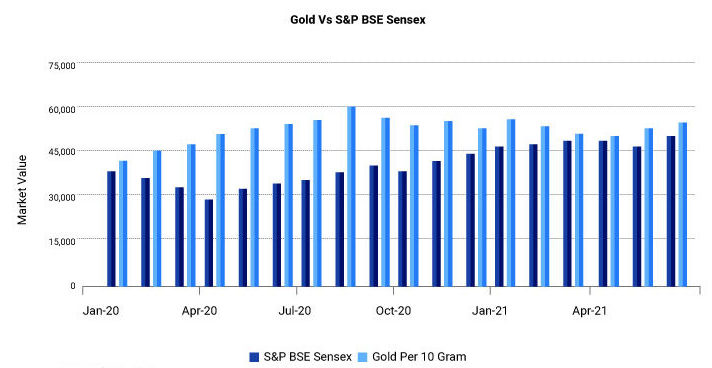
Notice that before the pandemic, both gold and S&P BSE Sensex were nearly at the same level. But since March 2020, they have gone opposite ways. While Sensex fell to all time lows in April 2020, gold reached an all-time high in August 2020.
This happens every time. Whenever equity markets fall, investors shift to gold as a safe heaven and gold prices appreciate. So, the biggest advantage of gold mutual funds is that it balances the loss from your equity mutual funds.
2. Affordability:
Investing in gold mutual funds is extremely affordable. To buy one gram of physical gold, you will have to pay Rs 4,690.
This might not be affordable for some investors. But you can invest in gold mutual funds with just Rs 100 per month.
Invest in best gold mutual funds for 2021 in less than 5 minutes.
3. Gold is Inflation-Proof:
Inflation is when the price of goods and services increases in a period of time. Gold is considered to be inflation-proof.
This means that the growth in gold will always be more than inflation rate. The below chart shows the growth of gold and inflation.
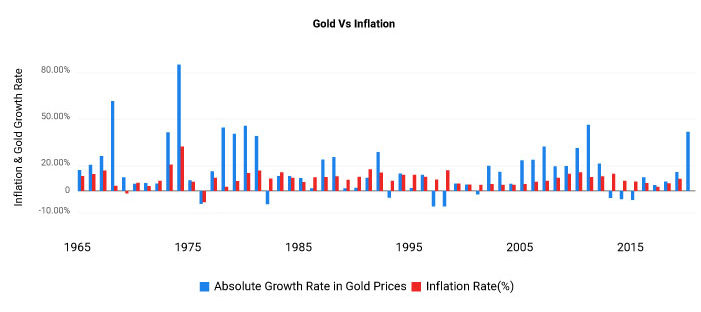
Notice that majority of the times, gold has beaten inflation. Thus, we can conclude that gold mutual funds are a great protection against inflation.
4. Easier to Sell:
This is a huge advantage of investing in gold mutual funds over physical gold. When you sell physical gold, the jeweller will charge 1%-2% making charges.
Additionally, the value of the stone (diamond, sapphire, ruby) will not be included while selling. There are other wastages that reduce the overall price of your jewellery. All this reduces your selling price by 2%-2.5%.
So, basically you pay more while buying and earn less while selling. Let us understand this with an example.
| While Buying | |
| Total Weight of the ring | 10 grams |
| Total Cost | Rs. 48,637 |
| Cost per gram | Rs. 4,864 |
| While Selling | |
| Total weight of the ring | 10 grams |
| Wastages | 0.5 grams |
| Market Price per gram | Rs. 5,003 |
| Making Charges (2%) | Rs. 1,001 |
| Sales Proceeds | Rs. 47,529 |
| Total Loss | Rs. 2,502 |
Suppose you bought a ring with diamonds on 1st April 2020. The total weight was 10 grams. You paid Rs 48,637 for the ring. After a year, you had to sell your ring for some emergency. On 1st April 2021, the price of gold is Rs 50,030 per 10 grams.
You think you made a profit of Rs 1,393. But wait, the jeweller pays you only Rs 47,529. Notice that the price of gold has gone up. But you still made a loss of Rs 2,502. This is because the jeweller will remove making charges and wastages from the sales price.
This does not happen in case of gold mutual funds. Here you do not have to pay making charges as you are holding electronic gold. On maturity, you can redeem for the existing price of gold without any deduction.
If you had invested the same Rs 48,637 in a gold mutual fund, you would have received Rs 50,030 on maturity.
5. Low Storage Costs:
Storing physical gold is another hassle. You cannot store large quantities of gold at your home due to fear of theft. While bank lockers are a good option, they are quite expensive.
This is where gold mutual funds are superior as you are holding electronic units of gold. The equivalent physical gold is actually stored in vaults with superior safety.
Regular checks and audits are performed at these vaults and hence your physical gold remains safe from theft or loss.
6. Purity of Gold:
When you buy physical gold, you rely 100% on your jeweller regarding its purity. But small jewellers often adulterate gold and while you pay full price, you do not get 100% gold.
This problem is eliminated in gold mutual funds. The fund manager only buys gold with 99.5% purity and a certificate of authenticity from World Gold Council is provided with each unit of physical gold.
So, when you invest in gold mutual fund, you get 99.5% pure gold.
7. Price Discovery:
Have you ever noticed that the price you pay for making a gold ornament is much higher than the actual price of the gold? This happens because the jeweller adds various charges and inflates the cost while buying.
So, the price discovery is opaque. But in case of gold mutual funds, the price discovery is transparent. The price of gold mutual fund is always in line with the domestic price of gold.
8. Ease of loans:
One of the reasons for popularity of gold is that it can be used as a collateral for loans.
With jewellers at every corner, taking a gold loan has become easy.
But did you know that jewellers charge as high as 15%-18% interest on these loans? Whereas you can easily avail a loan against your gold mutual fund units at a lower interest rate of 6%-8%.
Hence, investing in gold mutual fund is useful during difficult times.
9. High Liquidity:
Selling physical gold is time consuming and it is almost always sold at a discount to its market rate. Some jewelers may not accept gold bought from other shops. This will lead to further price reduction.
There is no such hassle in gold mutual fund. Here, you simply have to submit the redemption form to the fund house and you will receive the equivalent value without any discounts.
This is also where gold mutual funds score higher than gold ETFs. Since gold etfs are sold on an exchange, finding a buyer with the same requirements can be tough. Hence, gold mutual funds offer highest liquidity.
10. Well Regulated:
The physical gold market is an informal market. Here, the jeweller’s word is final. They decide the price at which they will buy or sell gold. At times, there is gross misuse of this power.
However, gold mutual funds are regulated by the Securities and Exchange Board of India (SEBI). From fund houses to the asset management companies, everyone works under strict SEBI rules.
Till date, there has been no price manipulation in gold mutual funds. Hence, gold mutual funds are very safe.
4 Key Disadvantages of Gold Mutual Funds
1. Average Returns:
When you are investing in gold mutual funds, you cannot earn superior returns like equity mutual funds.
The below table shows the performance of gold mutual funds against actively managed mutual funds:
 Source: www.rankMF.com *Data as on 7th July 2021.
Source: www.rankMF.com *Data as on 7th July 2021.
Across all periods, gold mutual funds have not been able to beat actively managed mutual funds. In fact, they are not even able to beat debt funds except in the three-year period.
 Source: www.rankMF.com *Data as on 7th July 2021.
Source: www.rankMF.com *Data as on 7th July 2021.
Hence, investors must keep average return expectations from gold mutual funds.
2. Double Fund Management Charges:
When you invest in gold mutual fund, the fund manager will in turn buy units of gold ETFs. This gold ETF will then buy the actual physical gold.
So, you end up paying double fund management charges – one to the gold mutual fund manager and the other to gold ETF manager.
But you do need a Demat account to invest in gold ETFs. Demat accounts have their own charges. So, the additional expense ratio gets squared-off with Demat fees and charges.
3. Highly Volatile:
Many investors believe that gold as an asset is stable and less volatile. However, this is not true. In the last year, gold mutual funds have had a crazy downward journey.
 Source: www.rankMF.com *Data as on 7th July 2021.
Source: www.rankMF.com *Data as on 7th July 2021.
The three-year return of gold mutual funds was 14.77%. But in the last one year, it has shed all its gains. It reached a fresh low of -7.61% in the last six months.
Despite being a store of value, gold mutual funds have witnessed crazy corrections. Hence, investors need to be careful while investing in gold funds.
4. No Dividends:
Unlike equity or debt mutual funds, gold mutual funds do not declare dividends. In case of equity mutual funds, the dividend declared by stocks is passed on to investors.
Debt mutual funds earn interest income which they share in the form of dividends. But physical gold only appreciates in value, it does not give income in the form of interest or dividend.
Hence, 99.9% of the times, gold mutual funds do not declare dividends.
Watch this video to learn what is debt mutual fund:
Gold Mutual Funds Vs Gold ETF
Gold as an investment has evolved over time. Earlier physical gold was the only option available for investment. But now investors have a plethora of options … gold mutual funds, gold etfs, sovereign gold bonds and digital gold.
Of these, gold mutual funds and ETFs have seen maximum inflow from investors. While both have the same underlying asset i.e. gold, there are some key differences between them.
1. Ease of Purchase:
Gold ETFs are traded on the stock exchange. Hence a Demat account is compulsory while investing in gold ETF. However, you can invest in gold mutual funds without a Demat account.
If you don’t have a demat account yet then you can open it right away in 15 minutes and start investing in Gold ETF’s.
2. Price Discovery:
Gold ETFs are traded on the exchange on real-time basis. This means, you can buy and sell them anytime throughout the day at different levels. This is not possible in the case of gold mutual funds.
Here, irrespective of time of purchase, you get the units as per closing net asset value (NAV).
So, while you can enjoy intraday trading in ETFs, the same is not possible in case of gold mutual funds.
[Read More: Best Stocks for Intraday Trading]
3. Affordability and Convenience:
Majority of investors prefer systematic investment plan (SIP) as it is very affordable. You can start a SIP in gold mutual funds with just Rs 100 per month.
Traditionally, you cannot do a SIP in Gold ETFs. So, investors have to manually invest every month, which is quite a hassle.
But, Samco has launched a new feature through which you can register SIPs in gold ETFs as well! To take advantage of this new feature, open a FREE Samco Demat account today.
4. Easy Exit:
Majority of gold mutual funds have an exit load period of one or two years. This means that if you sell your units before 2 years, you will have to pay a penalty.
For example: The exit load for HDFC Gold Fund is as follows:
- 2% for redemption within 180 days
- 1% for redemption between 181 – 365 days
But gold ETFs do not have any exit loads. You can buy and sell them anytime without any charges.
5. High Expense Ratio:
This is an area where gold ETFs are better than gold mutual funds. Gold mutual funds are actively managed funds. Hence, they have high fund management costs and expense ratio.
Whereas gold ETFs are passively managed to mirror the benchmark. So, the management cost is minimum.
- Expense ratio of HDFC Gold Fund is Rs 0.80%.
- Whereas the expense ratio of HDFC Gold ETF is 0.62%.
This difference of 0.18% will become huge when compounded for 20—25 years. A high expense ratio directly affects your returns.
6. Past Performance:
The below graph shows the value of Rs 1 Lakh invested on inception in SBI Gold Fund vs SBI Gold ETF since its inception in 2009.
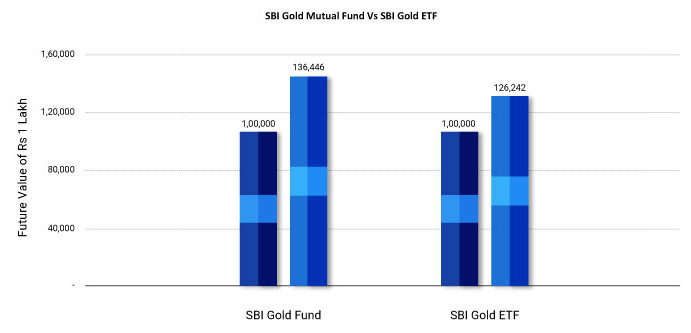
Despite having a higher expense ratio, SBI Gold Fund has outperformed gold ETF by a huge margin.
Watch this video to learn how to calculate your mutual fund returns
7. Easy Redemption:
An important characteristic of any good asset is that it can be redeemed easily. But that is not the case with gold ETFs. Since they are traded on the exchange, finding buyers is not easy.
Hence liquidity is very important while investing in gold ETFs. The below table shows the liquidity of five gold ETFs in India.
 Source: NSE India*Data as on 7th July 2021.
Source: NSE India*Data as on 7th July 2021.
As you can see, every gold ETF does not enjoy high liquidity. In fact, except Nippon India ETF Gold BeEs and SBI Gold ETF, there is very little liquidity in other ETFs. Low liquidity means less exit opportunities.
But in the case of gold mutual funds, you can withdraw anytime without worrying about the market liquidity as you are selling back to the fund house not on an exchange. Hence, gold mutual funds offer superior liquidity.
Gold Mutual Funds Vs Gold ETFs: A Summary
| Parameter | Gold Mutual Fund | Gold Exchange Traded Funds |
| Mode of Purchase | Demat account is not required | Demat account is compulsory. |
| Price Discovery | Units allotted as per day’s closing NAV | Units allotted on real time basis like shares. |
| Affordability | You can start a SIP from just Rs 100 per month. | SIP is not allowed in gold ETFs. You can only invest lumpsum. |
| Exit Load | Exit load up to two years | No exit loads. You can buy and sell within minutes. |
| High Expense Ratio | Expense ratio is higher as they are actively managed. | Lower expense ratio as it is passively managed. |
| Easy Redemptions | Liquidity is not an issue as units are repurchased by the AMC. | Liquidity is a big concern as units are traded on exchange and finding a buyer can be difficult. |
Gold Mutual Funds Vs Sovereign Gold Bonds (SGBs)
Sovereign gold bonds (SGBs) are issued by the Reserve Bank of India on behalf of the government of India. The aim is to encourage investors to shift from physical gold to digital gold.
SGBs are government bonds but the units are allocated in grams of gold. They track the exact movement of gold without you holding the physical gold. These gold bonds are redeemed in cash on maturity…just like gold mutual funds.
SGBs are an excellent way of investing in gold without incurring storage or insurance charges. The best thing is that they carry the sovereign guarantee.
This means your investment is 100% safe from default risk. Additionally, SGBs also offer 2.5% guaranteed annual interest to investors.
But these bonds do not have easy liquidity like gold mutual funds. SGBs have a lock-in period of eight years. So, your money is locked in for eight years! This can be an issue for investors with short term or medium-term goals.
Hence, while both gold mutual funds and SGBs track the same asset, gold mutual funds are highly liquid and hence a better option.
Gold Mutual Fund Taxation
Outside India, gold mutual funds invest in shares of gold mining companies. But in India, gold mutual funds invest in gold ETFs which buy physical gold. Hence gold mutual funds follow debt taxation.
The holding period for gold mutual funds is 3 years (36 months).
| Holding Period | Type of Gains | Tax Rate |
| Less than 36 months | Short term capital gains (STCG) | As per the income tax slab |
| More than 36 months | Long term capital gains (LTCG) | 20% with indexation |
Let us take a closer look at each of these top 5 gold mutual funds for 2021.
1. Nippon India Gold Savings Fund:
This is one of the best gold mutual funds in India. It has generated a return of 14.58% in the last three years. The fund has a decent AUM of Rs 1,429 crores. This is 126% higher than category average.
The fund invests 99.98% of the corpus in Nippon India ETF Gold BeEs. The remaining is invested in cash and cash equivalents. The fund has a relatively low lock-in period of 15 days only. Investing in Nippon India Gold Savings Fund is highly affordable as you can start SIP with just Rs 100 per month.
The fund’s expense ratio of 0.32% is 41% lower than category average. The fund has a high turnover rate of 93% and carries moderate-high risk.
It is truly the best gold mutual fund as it has beaten its peers by a huge margin in the long-term.
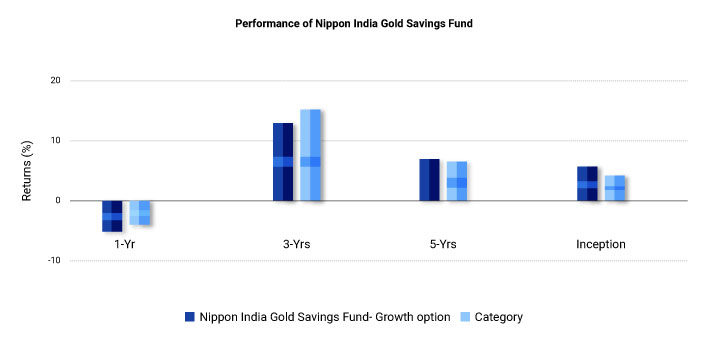
2. Quantum Gold Savings Fund:
This fund is not very popular among investors as its AUM is only Rs 68 crores. But still it is one of the best gold mutual funds in India. Its expense ratio is only 0.21% which is 32% lower than category average.
The best part is that the fund has no exit loads. The fund’s turnover ratio is only 12.52%, which means the fund manager is not churning the portfolio much.
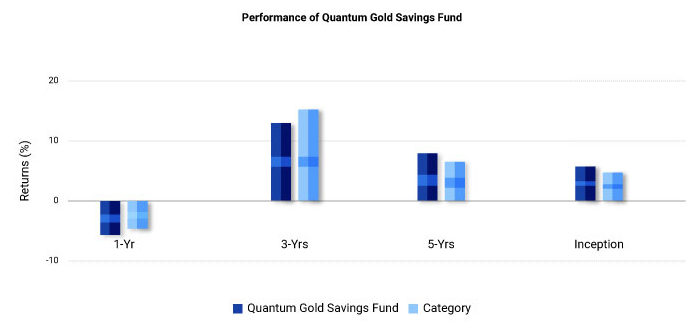
3. Invesco India Gold Fund:
This is a fairly new fund but nevertheless it has generated superior returns. It has an AUM of Rs 50 crores. The fund has a high expense ratio of 0.45%.
It invests 98.90% of the corpus in Invesco India Exchange Traded Fund. The fund has a higher exit load period of 12 months. Minimum SIP in the fund is Rs 500.
The fund has been able to beat the category average in the long-term.
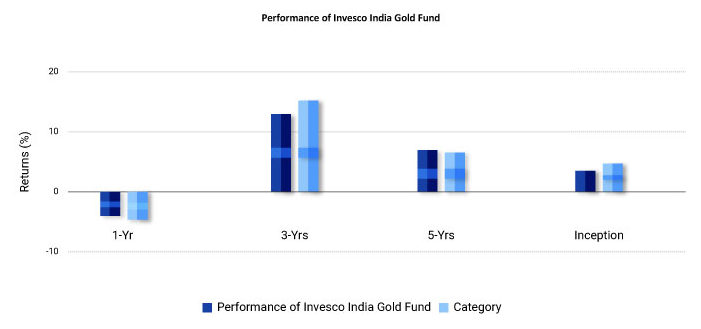
4. Aditya Birla Sun Life Gold Fund:
The fund has generated a return of 14.36% in the last three years. Its AUM is a decent Rs 241 Crores. Its expense ratio is 0.50%, which is 47% lower than the category average.
The fund has a lock-in period of 365 days. It has a higher minimum SIP of Rs 1,000.
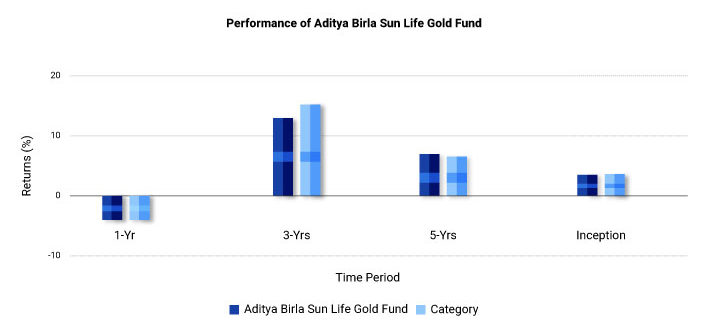
5. ICICI Prudential Regular Gold Savings Fund (FoF):
The fund has generated a return of 14.59% in the last three years. It has an AUM of Rs 540 Crores. Its expense ratio of 0.53% is 68% lower than the category average.
The fund has an exit load period of only 15 days. Minimum SIP in the fund is Rs 100 per month. The fund invests 99.90% of its corpus in ICICI Prudential Gold ETF.
 Source: www.rankMF.com *Data as on 7th July 2021.
Source: www.rankMF.com *Data as on 7th July 2021.
How to Invest in the Best Gold Mutual Funds in India?
Forget about filling physical forms or standing in long queues to buy gold mutual funds. You can invest in best gold mutual funds in India in less than 15 minutes with RankMF. To invest in the best gold mutual funds, follow the below :
- Use you Samco Demat account credentials to login to RankMF. If you don’t have a Samco Demat account yet then open a FREE Demat account in less than 15 minutes!
- When you open a Samco Demat account you get FREE access to RankMF, KyaTrade and StockNote.
- Complete your Know your Customer (KYC) formalities. This will take you less than 5 minutes.
- Shortlist the fund you want to invest in.
- Register SIP or make lumpsum investments in your favourite gold fund and you’re done!
FAQs on Gold Mutual Funds
-
What are gold mutual funds?
Gold mutual funds are actively managed mutual funds which invest in gold exchange traded funds. They in turn buy gold bullion with the collected corpus. Their aim is to mirror the returns generated by gold.
-
How does gold mutual fund work?
The fund manager of a gold mutual fund collects money from various investors. This pool of money is then invested in gold ETFs. The fund manager of Gold ETF will buy physical gold and store in vaults of the custodian. On maturity, investors can redeem their units at the domestic price of gold.
-
Where do gold mutual funds invest?
Gold mutual funds can invest the pooled money in:
- Physical gold bullion like bars, coins etc.
- Debt instruments like reverse repo instruments, TREPs etc.
- In other countries, gold mutual funds also invest in gold mining or distributing companies.
-
When to invest in gold mutual funds?
Majority of investors invest in gold mutual funds only during political instability or economic downturns. But since you cannot predict such events, it is always recommended to invest 5%-10% of your portfolio in gold.
-
How are gold mutual funds taxed?
The taxation of gold mutual funds is as follows:
- If you sell before 3 years (36 months), the gains will be considered as short term capital gains (STCG). It is added to your total income and taxed as per income tax rate.
- If you sell after 3 years, a 20% long term capital gains (LTCG) tax with indexation is applicable.
-
What is the difference between gold mutual funds and gold ETFs?
Both gold mutual funds and gold ETFs track the same asset i.e. gold. But gold ETFs can be traded on an exchange like shares. Whereas you can buy and sell gold mutual funds through the AMC only.
-
Which gold ETF is the best?
When you are investing in a gold ETF, keep the following things in mind:
- Low expense ratio.
- Low tracking error.
- High liquidity.
Based on these, Nippon India ETF Gold BeEs or SBI Gold ETFs are some of the best gold ETFs.
-
Which is better…Gold mutual funds vs SGBs?
If you have a longer time horizon of say more than eight years, then you can invest in SGBs. Here you will also enjoy a 2.5% guaranteed annual interest alongside 0% default risk. But if your time horizon is less than eight years and you need liquidity then you should invest in gold mutual funds.
-
Which is better … Gold mutual funds vs physical gold
Gold mutual funds are much better than investing in physical gold. Buying physical gold is expensive as you also need a bank locker to ensure safety against theft. Plus, while selling, the jeweller will remove making charges and wastages from its value. So, you will get lower than the domestic price of gold.
Gold mutual funds will also track gold prices. But in this case, you do not have to worry about theft or storage as it is stored electronically.
-
What are the disadvantages of gold mutual funds?
The two main disadvantages of gold mutual funds are:
- High expense ratio compared to gold ETFs. But this is compensated with higher returns and liquidity.
- Double fund management charges as gold mutual funds will eventually invest in gold ETFs only. So, investors pay twice the fund management fees.
-
How to buy gold mutual funds?
Investing in gold mutual funds with RankMF is uncomplicated and easy. Here is a step-by-step guide on how to buy gold mutual funds:
- Open a FREE RankMF account.
- Select which gold mutual fund you want to invest in.
- You can opt for both SIP and lumpsum investment. The minimum SIP required is Rs 500. For lumpsum investment, you need a minimum of Rs 1,000.
-
Which is the best way to invest in gold in India?
The five best gold mutual funds in India are:


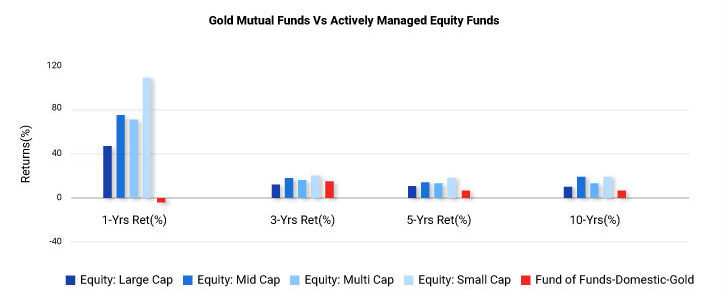 Source:
Source: 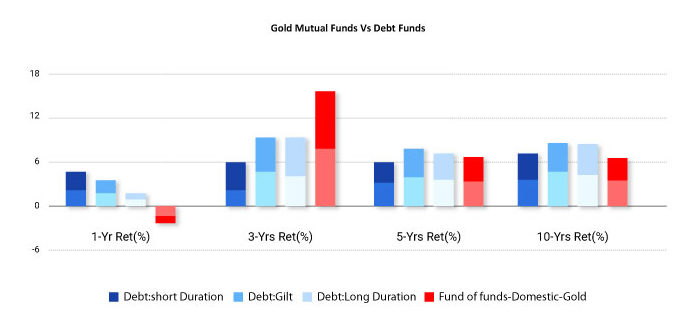 Source:
Source: 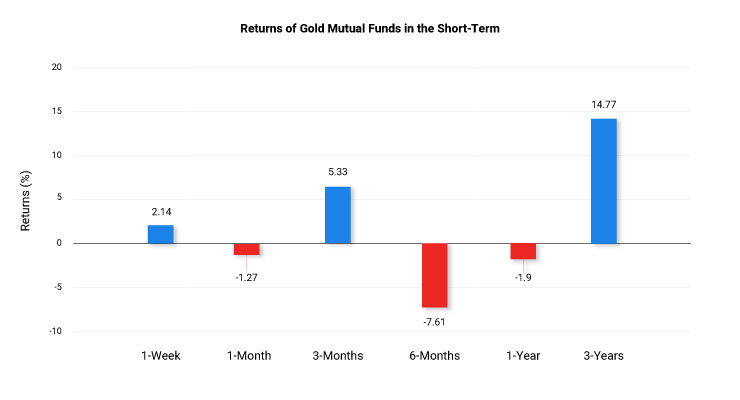 Source:
Source: 
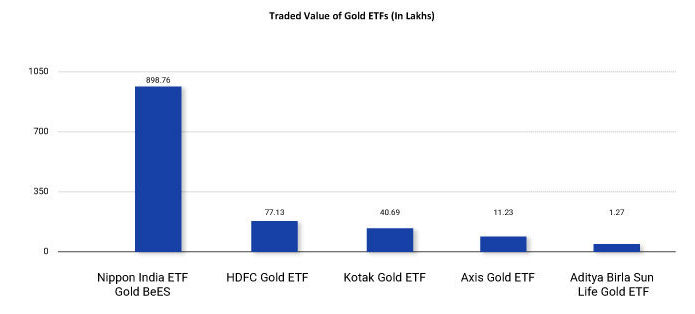 Source: NSE India*Data as on 7th July 2021.
Source: NSE India*Data as on 7th July 2021.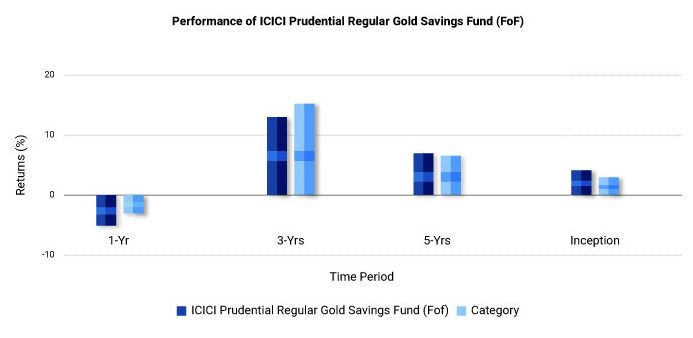 Source:
Source: 
Leave A Comment?